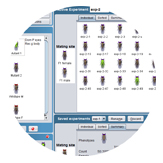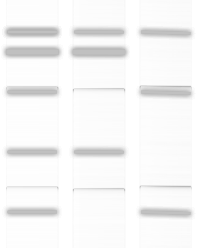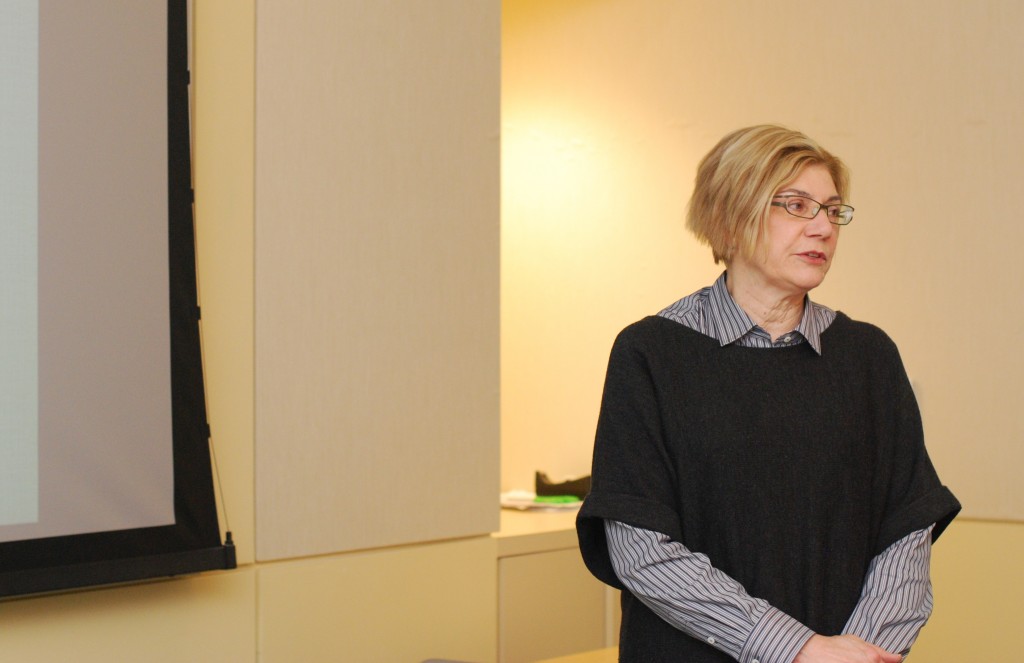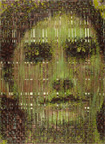 Professor Helen Donis-Keller
Professor Helen Donis-Keller
Title: The Portfolio Project: Helping students take more responsibility for their learning
Group Meeting Date & Time: Wednesday, March 7, 2012 @ 2:00 pm
View the slides presented at this Group Meeting
View a handout of the Portfolio Project containing with descriptions, examples and rubric.
A scientist and artist for her entire professional life, Professor Helen Donis-Keller is currently Professor of Biology and Art at the Franklin W. Olin College of Engineering in Needham, Massachusetts. Professor Donis-Keller received a Ph.D. in Biochemistry and Molecular Biology from Harvard University and an M.F.A. in Studio Art from the School of the Museum of Fine Arts and Tufts University. For the past ten years, she has taught the introductory biology course, SCI1210 Principles of Modern Biology, which is required of all undergraduates.
As a scientist and an artist, Professor Donis-Keller brings an inspiring and novel outlook to science education. During her group meeting, Prof. Donis-Keller told the audience about a unique project, termed the Portfolio Project, that she first implemented in her classroom three years ago. The Portfolio Project is designed to require students to take responsibility for their learning by writing reflections on their learning and their academic progress and by correcting a subset of their assignments from the course of the semester.
When Professor Donis-Keller first designed the project, she ensured that the following considerations were taken into account. First, the portfolio project must have an impact on the student’s overall course grade. Second, students must view the portfolio project in a positive light. And most importantly, students must take more responsibility for their learning. In order to address the first two considerations, Prof. Donis-Keller has designed the portfolio project so that it is worth 10% of the course grade. Making the portfolio project matter for students’ grades has been important for the success of this project. In addition, the portfolio project covers 5 of the 9 competencies that are used to assess students at Olin College : 1) communication, 2) diagnosis, 3) context, 4) qualitative reasoning, and 5) life-long learning.
A complete Portfolio contains representative pieces of work from the course of the semester, corrected quizzes, and a reflection on their learning over the course of the semester. More specifically, the portfolio contains seven requirements: 1) 3 out of the 4 quizzes, corrected; 2) a choice between one in-class problem, homework assignment and a discussion question; 3) additional entry of the student’s choice; 4) laboratory report; 5) final course assessment and reflection; and 6) optional teaching/learning module.
One current challenge is how to motivate students to work on their portfolios throughout the semester. Because compiling the portfolio is often a new experience for the students, Professor Donis-Keller provides extensive feedback on drafts of two of the seven portfolio entries mid-way through the semester. Despite this, continuous reflection throughout the semester remains a challenge for some of her students. She also provides examples of good (see Figure 1) and bad portfolios, which help clarify the instructor’s expectations of the portfolio for the student. When reflecting on their learning, students consider 8 different measurable outcomes using a rubric that Professor Donis-Keller provides to her students.
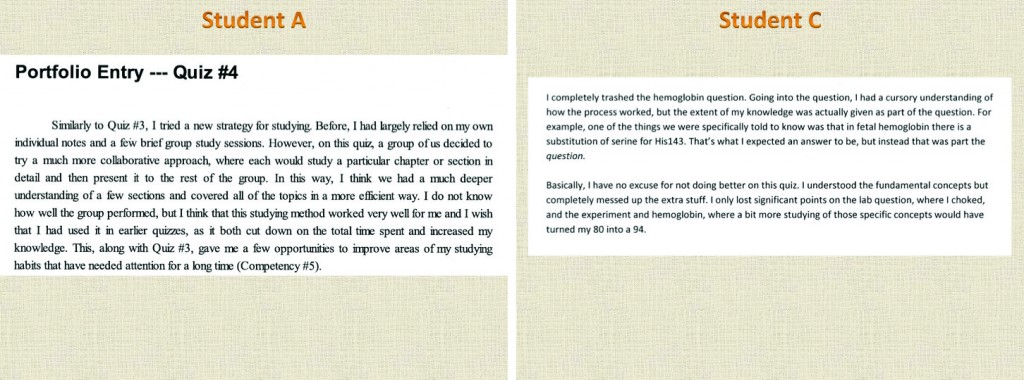
Figure 1. Left: A sample reflection from an "A" portfolio demonstrating the student's ability to reflect on his/her own learning. Right: A sample reflection from a "C" portfolio which demonstrates an awareness of what went wrong with the learning process, but fails to reflect what could be done to learn from these experiences and the course. Click image to enlarge.
The portfolio is then assessed based on a set of measureable outcomes and competencies, such as the ability of student to communicate, understand, and reflect upon modern biology concepts. A superior portfolio not only requires a neat and orderly collection of the portfolio requirements, but also an in-depth understanding of Biology concepts, a deep reflection of their own learning, and evidence of academic progress during the semester.
Professor Donis-Keller has found that the portfolio project truly enables a student to take more responsibility for his or her own learning. In addition, it provides a window into what students actually think about their learning, which they are often hesitant to communicate in person. While not every student realizes the benefit of reflection, hopefully they are able to apply the ability to assess their own strengths and weaknesses to future classes. Professor Donis-Keller has observed that implementing the portfolio project in her class has resulted in more mature learners. Not only has the portfolio project enabled students to reflect on their learning and learn from their mistakes, but the project has also provided Prof. Donis-Keller with unique insights into how students learn. These insights have been incorporated into her course to benefit student learning in the years to come. Professor Donis-Keller pointed out during her talk that although her small class of students affords her to incorporate a multi-component portfolio involving 7 different entries, she believes larger courses could still benefit from this approach by providing opportunities for self-reflection through the use of a single portfolio entry assignment.
Additional information on Professor Donis-Keller can be found on her website: HelenDonis-Keller.com.

